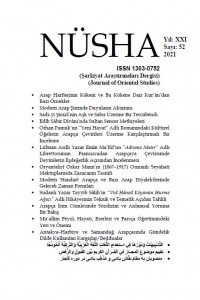Öz
1040 Dandanakan ve ardından 1071 Malazgirt zaferinden sonra oluşan kültür ortamında Selçukluların tarihi ile ilgili Farsça birçok tarihî manzum eser kaleme alınmıştır. Dönemin Selçuklu sultanları başta olmak üzere devlet adamları ve tarihi olayları ifade etmek için şiirler söylenmiştir. Şiire tarihi yansıtan bu şairlerden biri de Edîb Sâbir’dir (öl. 1151-1152). Selçuklu çağının önde gelen edip ve şairlerinden Edîb Sâbir’in, döneminin sultanları ve devlet ileri gelenleri üzerine görüşleri, duygu ve düşüncelerini anlattığı dîvânı üzerinden tarihî çıkarımlar yapmak önem arz etmektedir. Bu tespitler Sâbir’in, Sencer methiyelerindeki önemli ifadeleri ile pekişmektedir. Edebî kaynak üzerinden yapılan bu değerlendirme bir hayli mühimdir. Bu çalışmamızda Selçukluların özellikle sosyal ve dinî durumunu aydınlatmak için Edîb Sâbir ve Dîvânı’nda övgüde bulunduğu Sencer methiyelerinde Büyük Selçuklu devletinin tarihini, gücünü, dinî ve sosyal yapısını görmek mümkündür.
Anahtar Kelimeler
Kaynakça
- ‘Avfî, Muhammed, Lubâbu’l-elbâb, (1389/2010), nşr. Edward G. Browne-Muhammed-i Kazvînî, İntişârât-i Hermes, Tahran.
- Âzer-i Bîgdilî, Lutf Ali Beg, (1378/1999), Âteşkede-i Âzer, tsh. Mîr Hâşim Muhaddis, C 2, İntişârât-i Emîr-i Kebîr, Tahran.
- Cuveynî, Ata Melik, (1916), Târîh-i Cihânguşâ-yi Cuveynî, nşr. Muhammed-i Kazvînî, C 2, Leiden.
- Edîb Sâbir-i Tirmizî, (1331/1952), Dîvân-i Edîb Sâbir-i Tirmizî, tsh. Ali Kavîm, Kelâle-i Hâver, Tahran.
- Devletşâh-i Semerkandî, (1382/2003), Tezkiretu’ş-şu‘arâ, tsh. Edward Browne, Çâp-i Leiden, 1900, İntişârât-i Esâtîr.
- Furûzânfer, Bedî‘uzzamân, (1380/2001), Suhen u Suhenverân, İntişârât-i Hârezmî, Tahran.
- Handmîr, Gıyâseddîn, (1353/1974), Habîbu’s-siyer, nşr. Muhammed Debîr-i Siyâkî, C 2, İntişârât-i Hayyâm, Tahran.
- Hidâyet, Rızâ Kulîhân, (1382/2002), Mecmâ‘ul-fusehâ, tsh. Muzâhir Musaffâ, Neşr-i Emîr-i Kebîr, C 1, Tahran.
- Râzî, Emîn Ahmed, (1378/1999), Tezkire-i Heft İklîm, nşr. Seyid Muhammed Rızâ Tâhirî, C 2, İntişârât-i Surûş, Tahran.
- Safâ, Zebîhullah, (1369/1990), Târîh-i edebiyyât der Îrân, C 2, İntişârât-i Firdevs, Tahran.
- Şafak, Sâdık Rızâzâde, (1321/1942), Târîh-i edebiyyât-i Îrân, Çâphâne-i Dâniş, Tahran.
- Dâ’iretu’l-me‘ârif-i buzurg-i İslâmî, (1375/1996), Sâzmân-i Çâp u İntişârât-i Vezâret-i Ferheng u İrşâd-i İslâmî, C 7, Tahran.
Öz
Many Persian historical poetic works related to Seljuks were written in the cultural settings shaped after Dandanaqan Victory in 1040 and Manzikert Victory in 1071. At that period, the statesmen and particularly the Sultans of Seljuk Empire composed verses to describe the historical events. Poets of this era are located in a very central position in creating this type of works. Poets of Turkish origin and Persian poets writing poetry in this period, devoted most of their poems to verses on praise, expressing historical events. One of those poets reflecting history to the poetry is Adīb Sāber (date of death 1151-1152) who has a distinguished place among these poets. It is important to have historical deduction from his Dīwān in which Adīb Sāber, who was one of the prominent man of letters and poet at Seljuk period, expressed his views, emotions and thoughts on the sultans and statesmen of the period. Sāber’s poems in this Dīwān are filled with couplets telling Sancar’s and Seljuk’s statesmen’s features, triumphs, success and pieties. Besides, it is understood that the importance of religion and state order, Turkish-Islamic state traditions are emphasized. This identifications support his notable statements in eulogies for Sancar. This evaluation made through literary resources is highly crucial. In order to enlighten especially the social and religious situation of Seljuks in this study, it is possible to see the history, power, and religious and social structure of Great Seljuk Empire in eulogy for Sancar, which Adīb Sāber praised in his Dīwān.
Anahtar Kelimeler
Kaynakça
- ‘Avfî, Muhammed, Lubâbu’l-elbâb, (1389/2010), nşr. Edward G. Browne-Muhammed-i Kazvînî, İntişârât-i Hermes, Tahran.
- Âzer-i Bîgdilî, Lutf Ali Beg, (1378/1999), Âteşkede-i Âzer, tsh. Mîr Hâşim Muhaddis, C 2, İntişârât-i Emîr-i Kebîr, Tahran.
- Cuveynî, Ata Melik, (1916), Târîh-i Cihânguşâ-yi Cuveynî, nşr. Muhammed-i Kazvînî, C 2, Leiden.
- Edîb Sâbir-i Tirmizî, (1331/1952), Dîvân-i Edîb Sâbir-i Tirmizî, tsh. Ali Kavîm, Kelâle-i Hâver, Tahran.
- Devletşâh-i Semerkandî, (1382/2003), Tezkiretu’ş-şu‘arâ, tsh. Edward Browne, Çâp-i Leiden, 1900, İntişârât-i Esâtîr.
- Furûzânfer, Bedî‘uzzamân, (1380/2001), Suhen u Suhenverân, İntişârât-i Hârezmî, Tahran.
- Handmîr, Gıyâseddîn, (1353/1974), Habîbu’s-siyer, nşr. Muhammed Debîr-i Siyâkî, C 2, İntişârât-i Hayyâm, Tahran.
- Hidâyet, Rızâ Kulîhân, (1382/2002), Mecmâ‘ul-fusehâ, tsh. Muzâhir Musaffâ, Neşr-i Emîr-i Kebîr, C 1, Tahran.
- Râzî, Emîn Ahmed, (1378/1999), Tezkire-i Heft İklîm, nşr. Seyid Muhammed Rızâ Tâhirî, C 2, İntişârât-i Surûş, Tahran.
- Safâ, Zebîhullah, (1369/1990), Târîh-i edebiyyât der Îrân, C 2, İntişârât-i Firdevs, Tahran.
- Şafak, Sâdık Rızâzâde, (1321/1942), Târîh-i edebiyyât-i Îrân, Çâphâne-i Dâniş, Tahran.
- Dâ’iretu’l-me‘ârif-i buzurg-i İslâmî, (1375/1996), Sâzmân-i Çâp u İntişârât-i Vezâret-i Ferheng u İrşâd-i İslâmî, C 7, Tahran.
Ayrıntılar
| Birincil Dil | Türkçe |
|---|---|
| Konular | Edebi Çalışmalar |
| Bölüm | Makaleler |
| Yazarlar | |
| Yayımlanma Tarihi | 24 Haziran 2021 |
| Gönderilme Tarihi | 2 Aralık 2020 |
| Kabul Tarihi | 21 Aralık 2020 |
| Yayımlandığı Sayı | Yıl 2021 Cilt: 21 Sayı: 52 |


